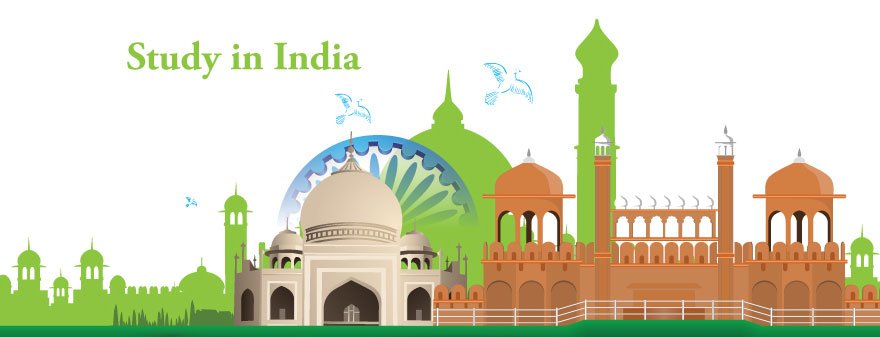Study in India – Benefits, Top Courses & Universities 2025 Guide
Are you planning to study abroad and considering India as your destination? You’re in the right place. In this blog, you'll discover everything about studying in India — from top-ranked universities and top courses in India to affordable tuition fees, scholarships, student visa requirements, and living conditions for international students.
Why Study in India?
Wondering why to study in India? Then, let's discuss why you should study in India.
India is quickly becoming a global hub for quality education. It offers a unique combination of best universities, affordable tuition fees, English- medium programs and diverse cultural environment.
India has many top universities and colleges in fields like medicine, engineering, business, and more. Compared to Western countries, the cost of studying in India is significantly lower and numerous scholarships for international students make it even more accessible.
Key Reasons to Study in India
The reasons to study in India may be different according to the person so the main reasons to study in India are as follows:
- Top-ranked universities
- World-recognized degrees
- Affordable tuition fees and low living costs
- English-medium programs
- Scholarships for international students
- Easy student visa process
- Diverse culture and student-friendly cities
- Popular courses like medicine, engineering, IT & business available
- Good job and internship opportunities
Top Universities in India
India is home to some of Asia’s best universities. Whether you’re looking for public universities or globally ranked private colleges, here are some top universities in India:
Indian Institute of Technology (IIT)
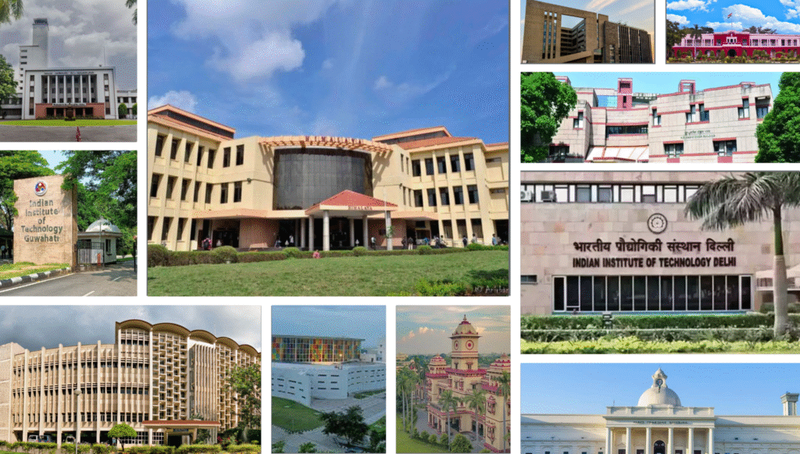
The Indian Institutes of Technology (IITs) are a group of autonomous public technical universities in India, known for offering world-class education in engineering, technology, science, and management. The IITs are considered the most prestigious engineering institutions in India and are globally recognized for their academic excellence.
What is IIT?
IIT stands for Indian Institute of Technology, a network of 23 top engineering institutes across India. These institutes were created to promote excellence in technical education and research. The first IIT, IIT Kharagpur, was established in 1951, and today, IITs are the dream of every aspiring engineer in India.
Why are IITs So Popular?
- Global Recognition: IITs are ranked among the top engineering institutes in the world.
- Quality Education: High-level academic curriculum with research-driven learning.
- Experienced Faculty: Professors from top global universities.
- High Placement Rates: Top companies from India and abroad hire IIT graduates.
- Government Funded: IITs are funded by the Ministry of Education, Government of India.
List of All 23 IITs in India (2025)
India currently has 23 Indian Institutes of Technology (IITs) spread across different states. The oldest IIT is IIT Kharagpur, established in 1951 in West Bengal, followed by IIT Bombay in Maharashtra (1958), IIT Madras in Tamil Nadu (1959), IIT Kanpur in Uttar Pradesh (1959), and IIT Delhi in New Delhi (1961). These are often referred to as the “old IITs.”
In later years, more IITs were established to expand access to quality technical education. IIT Guwahati in Assam was set up in 1994, and IIT Roorkee in Uttarakhand, which was originally founded as Thomason College in 1847, was converted into an IIT in 2001.
In 2008, a major expansion took place with the launch of IIT Ropar in Punjab, IIT Bhubaneswar in Odisha, IIT Gandhinagar in Gujarat, IIT Hyderabad in Telangana, IIT Jodhpur in Rajasthan, and IIT Patna in Bihar. In 2009, IIT Indore in Madhya Pradesh and IIT Mandi in Himachal Pradesh were added.
Another historically important institution, IIT (BHU) Varanasi in Uttar Pradesh, originally established in 1919 as Banaras Engineering College, was upgraded to IIT status in 2012.
Later, in 2015, the government opened IIT Palakkad in Kerala and IIT Tirupati in Andhra Pradesh. This was followed by IIT Bhilai in Chhattisgarh, IIT Goa, and IIT Jammu in 2016, alongside IIT Dharwad in Karnataka. Another significant upgrade occurred when ISM Dhanbad, a premier mining and technical institution established in 1926 in Jharkhand, was converted into IIT Dhanbad in 2016.
These 23 IITs are now considered the top engineering colleges in India, offering B.Tech, M.Tech, Ph.D., and management programs. Each IIT is known for its own specialization, infrastructure, academic research, and placement records, contributing significantly to India’s technological growth and innovation.
Popular Courses Offered at IITs
- B.Tech (Bachelor of Technology)
- M.Tech (Master of Technology)
- Ph.D. in Engineering and Science
- B.S., M.S. (Science programs)
- MBA (offered by IIT Delhi, Bombay, Kharagpur, and others)
Admission to IITs: How to Get In?
To get admission into the undergraduate B.Tech programs at IITs, students must:
- Appear for JEE Main (Joint Entrance Examination – Main).
- Qualify for JEE Advanced, which is the entrance exam specifically for IITs.
- Secure a top All India Rank (AIR) based on performance in JEE Advanced.
In 2024, over 2.5 lakh students qualified for JEE Advanced, but only 17,000+ got a seat in the IITs.
All India Institute of Medical Sciences (AIIMS)
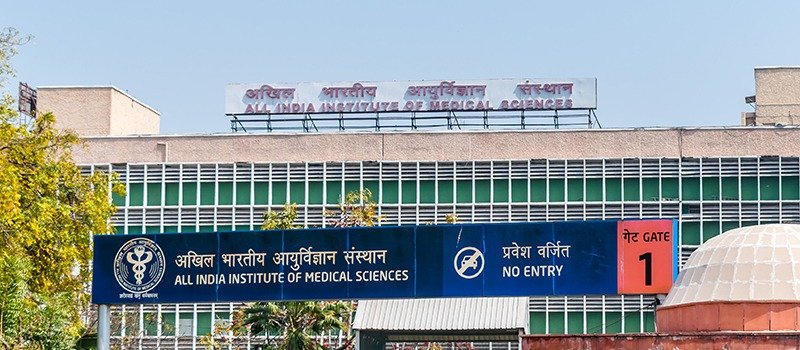
The All India Institute of Medical Sciences (AIIMS) is one of the top government medical universities in India, known for its world-class education, research, and patient care. Established in 1956 in New Delhi, AIIMS is an autonomous institute under the Ministry of Health and Family Welfare, Government of India. It was created to provide high-quality medical education, conduct cutting-edge medical research, and offer affordable healthcare to the people of India.
AIIMS offers a wide range of courses including MBBS, B.Sc Nursing, MD, MS, M.Ch, DM, and Ph.D. programs. Admission to AIIMS MBBS and other courses is highly competitive and is done through the NEET (National Eligibility cum Entrance Test) and INI-CET. AIIMS New Delhi is ranked among the best medical colleges in India and is considered the dream destination for MBBS aspirants.
Apart from AIIMS Delhi, there are several other AIIMS campuses across India including AIIMS Bhopal, AIIMS Bhubaneswar, AIIMS Jodhpur, AIIMS Rishikesh, AIIMS Raipur, and AIIMS Patna, all of which provide top-class medical education and hospital services.
AIIMS hospitals are known for advanced medical treatment, free or low-cost services, and expert doctors. The institute is also a leading center for medical research in India, contributing to innovations in surgery, medicine, and public health.
Whether you want to study MBBS at AIIMS, become a researcher, or get advanced treatment, AIIMS is one of the most prestigious and trusted medical institutions in India.
University of Delhi
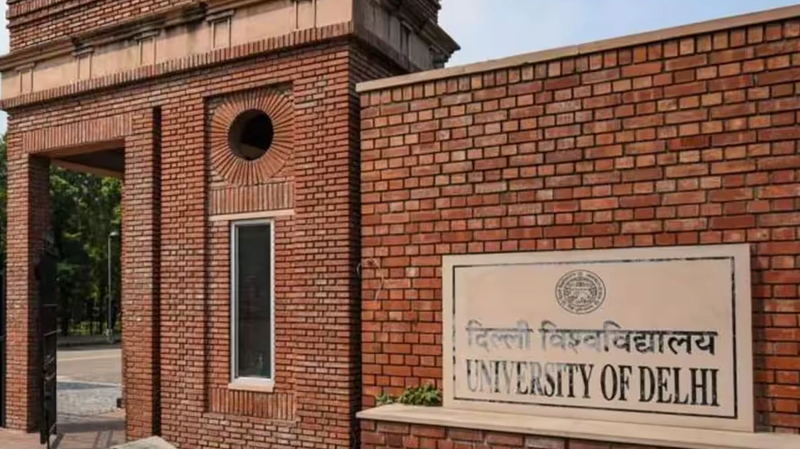
The University of Delhi (DU) is one of India’s top-ranked public universities, known for academic excellence across Arts, Commerce, and Science disciplines. Established in 1922, DU has grown into a premier educational hub, attracting millions of students from across India and abroad. With a rich heritage, world-class faculty, and a dynamic learning environment, Delhi University is considered one of the most prestigious institutions in India.
What is the University of Delhi?
The University of Delhi is a central public university located in the national capital, New Delhi. It comprises 90+ affiliated colleges, 16 faculties, and over 80 academic departments. DU offers a wide range of undergraduate (UG), postgraduate (PG), and doctoral programs across various streams including Humanities, Commerce, and Science.
From colleges like Hindu College, St. Stephen’s College, Shri Ram College of Commerce (SRCC), and Miranda House, DU colleges are regularly ranked among the top in India by NIRF and other national surveys.
Why is DU So Popular?
Academic Excellence: DU has maintained a strong academic reputation with structured curriculum and updated syllabi across disciplines.
Top-Ranked Colleges: Colleges like SRCC (for Commerce), Miranda House (for Science), and Lady Shri Ram College (for Arts) are recognized nationally and internationally.
Affordable Education: As a government-funded university, DU offers high-quality education at very low tuition fees.
Diverse Courses: Programs are available in subjects ranging from English Literature, Political Science, and Economics to Physics, Chemistry, and Zoology.
Cultural Diversity: With students from every corner of India, DU is a melting pot of cultures.
High Placement Records: Top companies recruit from DU, especially from colleges like SRCC, Hansraj, and Hindu.
Popular Courses at DU
Arts
- B.A. (Hons) in English, History, Political Science, Psychology
- M.A. in Sociology, Hindi, Philosophy
Commerce
- B.Com (Hons), B.Com (Program)
- M.Com
Science
- B.Sc. in Physics, Chemistry, Mathematics, Zoology, Botany
- M.Sc. in Operational Research, Biochemistry, Electronics
DU also offers interdisciplinary and vocational courses, diploma programs, and certificate courses.
How to Get Admission to DU?
Admission to undergraduate courses at DU is now based on the Common University Entrance Test (CUET UG), conducted by the National Testing Agency (NTA).
Admission Process:
- Register for CUET UG.
- Appear and score well in CUET based on course preference.
- Apply through the DU Common Seat Allocation System (CSAS).
- Get allotted a college based on merit, category, and seat availability.
DU also offers PG admissions through CUET PG and Ph.D. admissions via entrance exams and interviews.
Why Choose DU?
- National and International Exposure
- Research Opportunities and Scholarships
- Massive Library Network
- NSS, NCC, and Active Societies
- Affordable Hostels and Transportation
- Cultural Fests like Crossroads, Mecca, and Rendezvous
DU is not just a university—it's an experience of intellectual growth, cultural exchange, and holistic development.
DU in Rankings 2025
- QS Asia Ranking: Among Top 100
- NIRF 2024 Rank: Among Top 10 Universities in India
- India Today Rankings: DU colleges consistently rank in top 3 for Arts, Commerce & Science
Jawaharlal Nehru University (JNU)
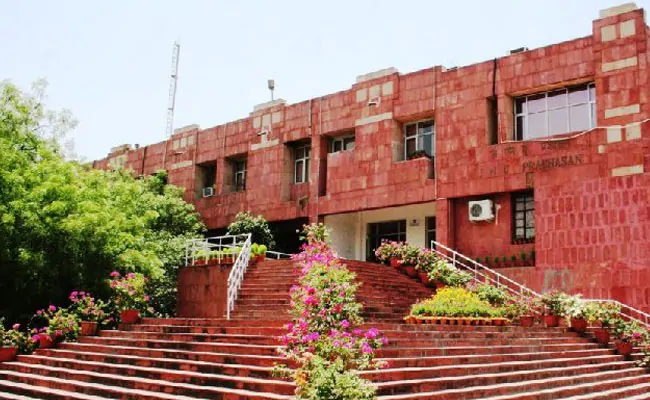
Jawaharlal Nehru University (JNU) is one of India’s most prestigious and research-oriented universities, located in the capital city, New Delhi. Established in 1969, JNU has carved a niche in academic excellence, critical thinking, and progressive learning. Known for its unique academic structure and diverse programs, JNU continues to attract students from all over India and abroad.
JNU Location
Jawaharlal Nehru University is located in South Delhi, near the Vasant Kunj and Munirka area. The campus is spread over 1,000 acres and is well connected by public transport. The tranquil environment, with greenery and wildlife, adds to the charm of the academic setting.
Jawaharlal Nehru University Courses
JNU offers a wide range of undergraduate, postgraduate, and doctoral programs across various disciplines:
- Arts & Humanities (History, Philosophy, Linguistics, Sociology)
- Social Sciences (Political Science, Economics, International Relations)
- Sciences (Biotechnology, Environmental Sciences, Life Sciences, Physics)
- Languages (French, German, Russian, Persian, Chinese, Japanese, Spanish)
- Engineering (Computer Science and Engineering via the School of Engineering)
- International Studies and Law
You can check the full list of JNU courses on the official website or through the prospectus available during admission.
Jawaharlal Nehru University Courses and Fees
One of the most attractive features of Jawaharlal Nehru University (JNU) is its affordable cost of education, especially compared to other central and private institutions in India. For example, BA (Hons.) programs at JNU cost approximately ₹300 to ₹400 per year, while MA, M.Sc., and MCA programs range from ₹400 to ₹500 annually. If you’re interested in technical education, the M.Tech program costs about ₹600 to ₹700 per year.
The Ph.D. programs are also economically priced between ₹400 and ₹600 annually. For those applying to engineering courses like B.Tech in Computer Science and Engineering, the fee is comparatively higher at ₹62,000 per semester, reflecting the specialized nature of the course. Despite this, the engineering program is still cost-effective relative to private universities. Additionally, hostel charges are remarkably low, costing just ₹240 per month, making JNU one of the most budget-friendly universities for residential students.
Jawaharlal Nehru University Admissions
Jawaharlal Nehru University course admissions are conducted through CUET (Common University Entrance Test) for UG and PG courses. For Ph.D. programs, JNU conducts its own entrance tests and interviews.
- UG/PG Admission: Through CUET
- Ph.D. Admission: Entrance + Interview
- Engineering (B.Tech): Through JEE Mains + JoSAA Counseling
For official details, visit: www.jnu.ac.in online registration portal and stay updated on admission timelines, eligibility, and syllabi.
Jawaharlal Nehru University Rankings
JNU consistently ranks among the top institutions in India:
- NIRF Ranking 2024 (India): #2 in University Category
- QS Asia University Rankings: Among top 200
- NAAC Accreditation: Grade A++
Its academic reputation, faculty excellence, research contributions, and inclusive atmosphere have made JNU a benchmark in higher education.
How to Register: Online Registration
For admissions, applicants must visit the official JNU portal:
- Go to: https://www.jnu.ac.in
- Click on Admissions
- Follow the link for CUET UG/PG or Ph.D. Entrance
- Fill the form, upload documents, and pay the fee online
- Track your application via the dashboard
Early registration is key, as seats are limited and competitive.
Summary: Why Choose JNU?
- Top-ranked public university
- Affordable fees & scholarships
- Diverse student community
- Research-intensive programs
- Renowned faculty
- Prime location in Delhi
- Excellent academic and career support
If you're looking to pursue higher education in India, Jawaharlal Nehru University is a powerful choice with high return on investment—academically and financially. From JNU courses and fees to its globally recognized rankings, the university stands tall as a hub of knowledge and innovation.
University of Mumbai
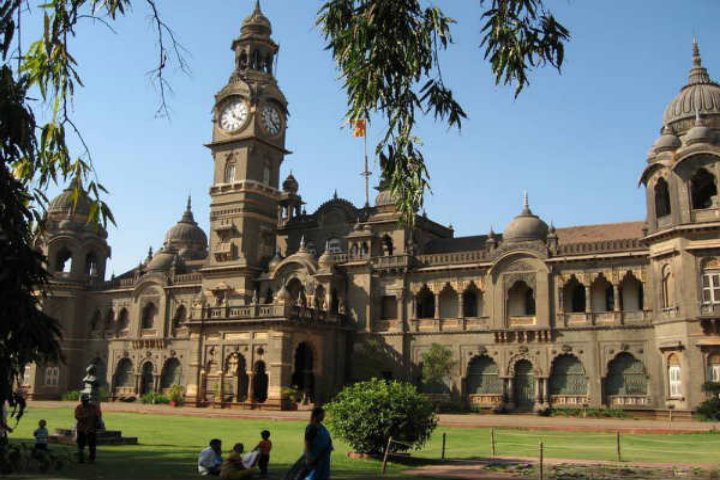
The University of Mumbai (MU), formerly known as the University of Bombay, is one of India's oldest and most prestigious public universities, established in 1857. It is located in Mumbai, Maharashtra, and offers a wide range of undergraduate, postgraduate, diploma, and doctoral programs across various disciplines.
University of Mumbai Courses & Fees
- B.A./B.Com/B.Sc – ₹3,000 to ₹8,000 per year (approx.)
- M.A./M.Com/M.Sc – ₹5,000 to ₹10,000 per year (approx.)
- Professional courses (BMS, BMM, Law, etc.) – ₹15,000 to ₹35,000 annually
- Ph.D programs – ₹10,000 to ₹25,000 (based on subject and duration)
Note: Fees vary based on the college and course specialization.
How to Get Admission in University of Mumbai?
- Visit the Official Portal: www.mu.ac.in
- Online Registration: Through the Mumbai University Admission Portal.
- Fill Application Form: Choose course, submit academic documents.
- Merit List or Entrance Exam: Based on course type.
- Verification & Fee Payment: Complete document check and pay fees.
Where is University of Mumbai Located?
- Main Address: University of Mumbai, Kalina, Santacruz East, Mumbai, Maharashtra 400098
- Landmark Campuses: Fort Campus (Heritage site), Kalina Campus (Main)
Why Choose University of Mumbai?
- A++ NAAC accreditation
- Global alumni network
- 700+ affiliated colleges
- Affordable education
- Offers modern and heritage campuses
- Diverse disciplines and flexible curriculum
Banaras Hindu University (BHU) – Known for Traditional and Modern Programs
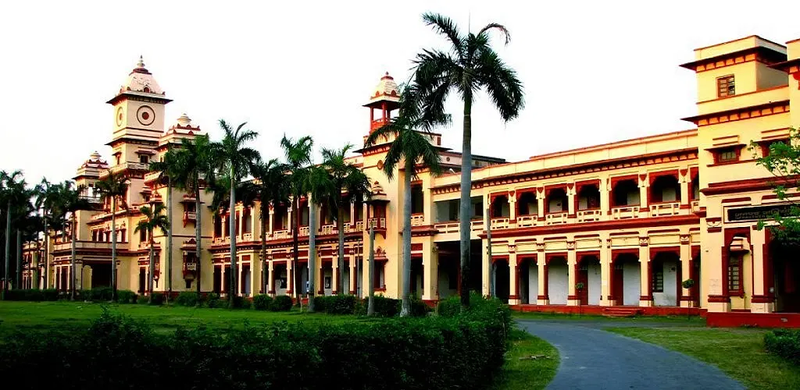
Manipal Academy of Higher Education – Known for MBBS and International Student Support
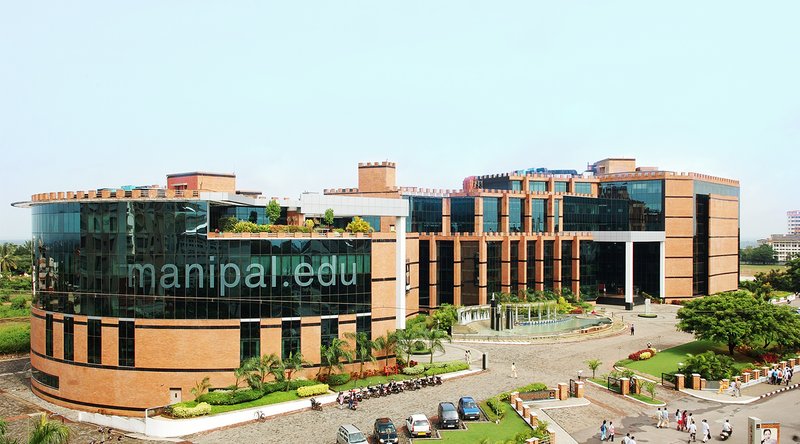
Amity University – Known for Business, Technology, and Design
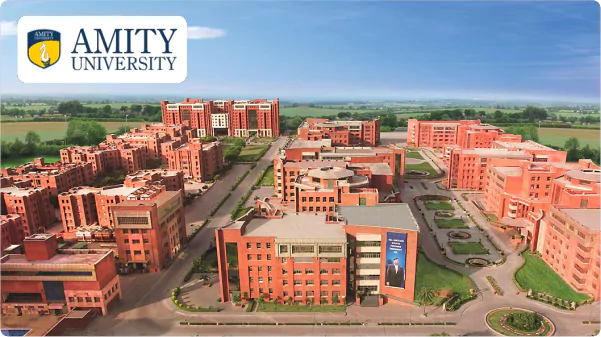
If you want to study in India, these are some of the best places to start your journey.These Indian colleges for international students provide a safe, inclusive, and competitive learning environment.
Top Courses in India
Many students choose to study in India because it offers many good courses, affordable tuition fees, and easy travel. Some of the top courses in India include:
- MBBS / Medicine – Best for affordable medical training
- Engineering & Technology (B.Tech) – Best at IITs, NITs, and Private Tech Institutes
- MBA / Business – Known for practical programs with good placement opportunities
- Computer Science & IT – Ideal for careers in software development, AI, and data science
- Pharmacy / Nursing – Best for healthcare-related careers
- Mass Communication & Design – Great for creative fields like media, UX/UI, and film
These courses are offered by many Indian colleges for international students, and many of them also provide ICCR scholarships. Students also get help with PG and hostel in India, and the cost of studying in India is more affordable than in many other countries.
Cost of Studying in India (Estimated Annual Expenses)
1. Tuition Fees
- Government colleges (e.g. MBBS, engineering):
- MBBS tuition ranges from ₹6,000 to ₹50,000 per year
- Engineering B.Tech (e.g., state-run): ~₹40,000 per year
- MBBS tuition ranges from ₹6,000 to ₹50,000 per year
- Private/deemed universities (MBBS):
- ₹2,00,000 to ₹25,00,000+ per year
- Top colleges/session-dependent:
- Christian MC, Vellore: ₹50,000–1,00,000
- KMC Manipal: ₹14 – 16 Lakh
- DY Patil, Mumbai: ₹24 – 26 Lakh
- Christian MC, Vellore: ₹50,000–1,00,000
- ₹2,00,000 to ₹25,00,000+ per year
Private MBBS can reach ₹20 – 30 Lakh per year after additional charges
2. Hostel & Accommodation
- Government hostels: ₹5,000–₹30,000 annually
- Private hostels or PGs: ₹50,000–1,50,000+ per year
- City shared apartments: ₹60,000–1,20,000 per year (~₹5,000–10,000 monthly)
3. Food & Transport
- Food (hostel/canteen/groceries): ₹36,000–72,000 per year (~₹3,000–6,000/month)
- Local transport: ₹6,000–24,000 per year (~₹500–2,000/month with public transit)
4. Books & Supplies
- General courses: ₹10,000–20,000 yearly
- Medical (MBBS/MBBS lab): ₹30,000–50,000 for textbooks, + ₹8,000–25,000 for instruments
5. Miscellaneous Fees
- University/exam/registration/medical/insurance: ₹10,000–50,000 per year
- Lab/research/demo charges: ₹10,000–50,000 annually
Scholarships for International Students in India
There are several scholarship programs for international students to help with fees such as:
- ICCR Scholarship Scheme (Government of India)
- SAARC & ASEAN Exchange Programs
- University-specific Merit Scholarships
- Embassy Assistance Programs
These scholarships may cover tuition fees, accommodation, and sometimes airfare. Always check eligibility and deadlines on the official university or Indian embassy websites.
Best Cities in India for Students
Many students who study in India want a city that feels safe, has top-ranked universities, and is comfortable to live in. Choosing the right city can greatly enhance your student life. Below are some of the best cities to consider for international students in India:
- Delhi – Cultural hub with top public universities; great if you want to study in Delhi
- Pune – Clean, safe, and academic-friendly; a top choice to study in Pune
- Dehradun – Calm and scenic, known for hospitality and management programs; ideal to study in Dehradun
- Bangalore – IT and tech capital with a diverse student crowd; a smart choice to study in Bangalore
- Mumbai – Offers business, finance, and media opportunities with top colleges; many students choose to study in Mumbai
- Manipal – Peaceful town with top medical universities; ideal for those who want to study in Manipal
- Hyderabad – Affordable city with top IT and biotech institutes; great for students who wish to study in Hyderabad
All these cities offer affordable education in India, plenty of PGs and hostels in India, and excellent career support for foreign students. You can apply to Indian universities and get a student visa for India easily.
How to Apply to Indian Universities?
- Choose Your Course – Research the field you’re interested in.
- Shortlist Universities – Look for recognized institutions that offer your course.
- Apply Online – Most universities have online applications through their website or the Study in India Portal.
- Submit Required Documents – Passport, academic records, recommendation letters, etc.
- Apply for Scholarships – Check if you’re eligible for financial aid.
- Get a Student Visa – Once accepted, apply for a student visa at the Indian Embassy in your country
- Book Your Flight & Prepare – Pack essentials and get ready for your Indian study journey!
Student Visa Requirements for India
Here are the basic student visa requirements for India:
- Passport (valid for at least 6 months)
- Admission letter from a recognized Indian university
- Proof of financial support
- Completed visa application form
- Passport-sized photos
- Medical fitness certificate
Always check the official Indian embassy website in your country for the latest requirements.
What Makes Studying in India Worth It?
Studying in India has many long-term advantages:
- The cost of studying in India is lower
- Highly qualified teachers and faculty for higher education in India
- Many Indian colleges offers support to International student
- Access to global companies and recruiters
- English-medium programs across all fields
- Welcoming and diverse campus culture
- Rich cultural exposure and global networking
Whether you're coming from Asia, Africa, Europe, or the Middle East, studying in India gives you the exposure, education, and experience to succeed.
Conclusion: Is India the Right Choice for You?
If you want quality education, affordable tuition fees, a mix of cultures, and chances to grow, India is a great choice. It has top-ranked universities, helpful people, and top courses to pick from. Studying in India can help you build a bright future.
So take your time, explore your options, and choose the future that’s right for you. Because your journey to success might just begin by choosing to study in India.
FAQ on Study in India
Why should I study in India?
India offers high-quality education at an affordable cost in fields like engineering, medicine, business, and arts. With top-ranked institutions like IITs, AIIMS, and IIMs, India is known for academic excellence, cultural diversity, and growing international recognition.
Is India good for international students?
Yes, India is a safe and affordable destination for international students. Many Indian universities offer English-medium courses, scholarships, and a multicultural environment that supports academic and personal growth.
What are the eligibility requirements to study in India?
To study in India, you must:
- Have completed 10+2 or equivalent education
- Meet course-specific requirements (e.g. science stream for MBBS/engineering)
- Qualify for entrance exams like NEET (for MBBS) or JEE (for engineering), if required
- Provide English proficiency scores (IELTS/TOEFL) if you're an international student
What is the cost of studying in India?
The cost of studying in India is much lower compared to the US, UK, or Australia. On average:
- Tuition fees: ₹50,000 – ₹3,00,000/year (govt colleges); ₹5L – ₹25L (private MBBS)
- Hostel & living expenses: ₹60,000 – ₹1,50,000/year
- Food & transport: ₹30,000 – ₹70,000/year
Do Indian universities offer scholarships for foreign students?
Yes, many universities offer merit-based and need-based scholarships. The Study in India (SII) program also provides scholarships to international students based on academic performance.
Which are the best courses to study in India?
Top courses in India include:
- Engineering (IITs, NITs)
- Medicine (AIIMS, state medical colleges)
- Business & Management (IIMs)
- Computer Science & IT
- Arts & Humanities
- Ayurveda and Yoga studies (popular among international students)
What exams do I need to study in India?
Entrance exams depend on your course:
- MBBS – NEET-UG
- Engineering – JEE Main & JEE Advanced
- MBA – CAT, MAT, or GMAT
- General courses – Some universities conduct their own entrance or accept foreign qualifications.
Can I work while studying in India?
Part-time work is not officially permitted on a student visa in India. However, internships and campus jobs may be available, depending on university rules.
Is a student visa required to study in India?
Yes, you need a valid Indian student visa (category "S") to study in India. You’ll need an offer letter from a recognized Indian university to apply.
What is the medium of instruction in Indian universities?
Most Indian universities offer English-medium instruction, especially in technical, medical, and professional courses.
